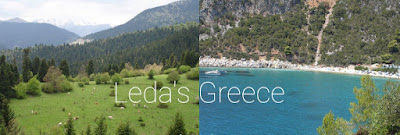Dancing has always been important to the Hellenic (Greek) people. In ancient times, dance, song, and music were all integral parts of the theater. In fact, the Greek word 'ΧΟΡΟΣ', (HOROS), referred to both dance and song. The English words chorus, chorale, choir, and choreography all come from this same Greek word. Furthermore, there are numerous references to dancing in ancient literature.
Today, Greeks dance for many reasons. For example, they use dance as a means of celebrating, as a form of self expression, and also as a part of ritualistic drama. In effect, dance is just as important to the Greeks of today as it was in ancient times. First, dancing is a part of the celebration of the important occasions in the lives of the Greek people; it is an important part of weddings, baptisms, name day (Saint's day) celebrations, and all religious holidays. Dancing also occurs spontaneously at taverns or in homes, often even without musicians. All that is needed is singing and fellowship. If the mood is right, dancing and singing will take place. We call it "kano kefi" or "exw kefi "which translates to: "make the mood/being in the mood/feeling cheerful". The celebration is an expression of the joy of the moment.
Today, Greeks dance for many reasons. For example, they use dance as a means of celebrating, as a form of self expression, and also as a part of ritualistic drama. In effect, dance is just as important to the Greeks of today as it was in ancient times. First, dancing is a part of the celebration of the important occasions in the lives of the Greek people; it is an important part of weddings, baptisms, name day (Saint's day) celebrations, and all religious holidays. Dancing also occurs spontaneously at taverns or in homes, often even without musicians. All that is needed is singing and fellowship. If the mood is right, dancing and singing will take place. We call it "kano kefi" or "exw kefi "which translates to: "make the mood/being in the mood/feeling cheerful". The celebration is an expression of the joy of the moment.
Dance is also a form of self expression. The dancer can "create a dance" by mixing various step variants with the basic step of a dance to make something new or different at that moment. This improvisation by individuals is an exciting part of Greek dance. In fact, each time the Greeks dance, the dance is different in some way from the way it was done before, or from the way it may be done in the future. The dancers can express joy, heroism, sadness, grace, strength, pride, anger, rejection, sensuousness, humor, and almost any other emotion through dance.
In Greek literature for instance, Zorba, in Zorba the Greek by Nikos Kazantzakis, must dance when his joy or sorrow are overwhelming. Just as in the ancient Greek drama, the emotions are purged or expressed through the catharsis of the dance and music. We can see such emotions expressed in a sad, heavy Zeibekikos, the happy, exuberant Syrtos, or the heroic, masculine Tsamikos or Beratis.
In Greek literature for instance, Zorba, in Zorba the Greek by Nikos Kazantzakis, must dance when his joy or sorrow are overwhelming. Just as in the ancient Greek drama, the emotions are purged or expressed through the catharsis of the dance and music. We can see such emotions expressed in a sad, heavy Zeibekikos, the happy, exuberant Syrtos, or the heroic, masculine Tsamikos or Beratis.
There are numerous types of traditional dances, depending on the origin, for example: Kalamatianos from Kalamata, Sirtos, Hasapikos, Ikariotikos, Tsamiko e.t.c. With several hundred (maybe over a thousand) different Greek dances, it's impossible to list them all.
[Ballos] [Cretan Syrtos] [Dodecanese Sousta] [Fysouni] [Gaida] [Hasapiko (& Syrtaki, Zorba)] [Ikariotikos] [Island/Silyvriano Syrtos] [Kalamatianos/Mainland Syrtos] [Kalymnikos] [Kapoutzidon/Macedonian Syrtos] [Karagouna] [Karsilamas/Antikrystos (Marinella)] [Kerkyraikos/Rouga] [Kleistos] [Koftos] [Kotsari] [Lerikos] [Leventikos] [Makedonia] [Malevyziotiko/Kastrinos Pidikhtos] [Menousis] [Pentozali] [Pogonisios] [Serra] [Sta tria] [Svarniara] [Tik] [Trata] [Tsakonikos] [Tsamiko] [Tsifte-Teli] [Tsirigotikos/Kythiraikos/Bourdaris] [Yerakina] [Zeibekiko] [Zonaradiko]
Dance also plays a part in ritualistic drama for the Greeks. The various dances which are used as bride's dances (Horos Tis Nyfis), Greek Thracian fire walkers' dances (Anastenaria), and for other uses are usually dances from the basic village repertoire which are used ritualistically on that occasion, sometimes to a special song. For instance, one of the national or pan-Hellenic dances such as the Syrtos can be used as a wedding dance (Horos Tou Gamou), a bride's dance (Tis Nyfis), or for many other purposes. Thus, Greek dances are also used ritualistically for those "rites of passage" which mark important occasions in the lives of the Greek people.
The ritual use of dance can be seen in the traditional Byzantine form of the Greek wedding as it is still performed in the Greek Orthodox wedding ceremony. The bride and groom, the priest, and the koubaros perform a procession circling around a table three times to the song "Isaia Horeve." This ritual procession is supposed to represent a dance, and it is done in an open circle moving counter-clockwise, just as the majority of the Greek dances are danced. It follows the crowning of the couple with the stefana, or flowered crowns, and it marks their first movement as a couple (androgyno) in their new married state. Here, the word "horeve," which means dance, also means rejoice as a synonym for "dance and sing."
Mentioning just a few, according to origin:
- Thrace: Zonaradikos, Baitouska, Troupaiti, Sigkathistos, Mantilatos, Souflioutouda
- Epirus: Giatros, Tsamikos, Zagorisios, Fissouni, Blaha Konitsas, Pogonisios Sta tria,Koftos,Fesodervenagas
- Aegean Islands: Nisiotikos Sirtos, Ikariotikos, Blaha Naksou, Sousta Rodou, Ballos, Zeibekikos
- Macedonia: Gaida, Enteka, Gerakina, Kori Eleni, Makedonia Ksakousti, Kaggeleftos Makedonikos, Syrtos Pileas, Partalos (tis Partalos), Omorfoula, Akritikos
- Sterea: Syrtos
- Thessaly: Karagouna, Pera ston pera mahala, Despo, Pilioritikos
- Ionian Islands: Kerkiraikos, Lefkaditikos, Ai-Giorgis, Thiakisios
- Peloponese: Tsakonikos
- Crete: Pentozalis, Kritikos Sirtos, Maleviziotikos, Haniotikos
- Pontos*: Tik
- Asia Minor: Hasapiko, Hasaposerviko

